Premium Only Content
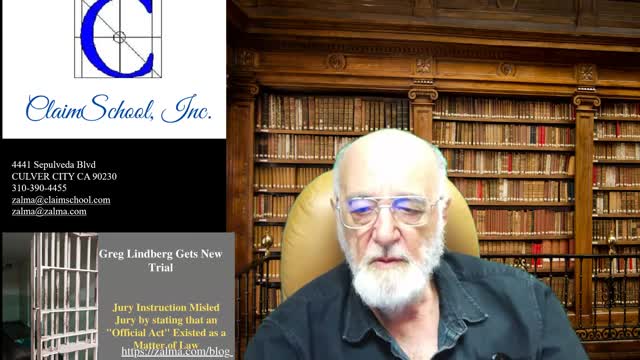
Greg Lindberg Gets New Trial
Jury Instruction Misled Jury by stating that an "Official Act" Existed as a Matter of Law
Greg E. Lindberg and John D. Gray were convicted of honest services fraud and federal funds bribery in connection with a series of payments and offers of payment, in the form of campaign contributions, made to Mike Causey, the elected Insurance Commissioner for North Carolina. The jury found that these payments were made in exchange for Causey assigning a different Deputy Commissioner to oversee the affairs of Lindberg's insurance companies.
In United States Of America v. Greg E. Lindberg, Nos. 20-4470, 20-4473, United States Court of Appeals, Fourth Circuit (June 29, 2022) the Fourth Circuit granted a new trial
FACTS
Greg E. Lindberg served as chairman of Eli Global LLC, an investment company, and as owner of Global Bankers Insurance Group, an insurance management company, during the relevant period from April 2017 to August 2018. Lindberg owns several insurance businesses subject to regulation in North Carolina. John D. Gray worked as a consultant for Lindberg during the relevant period. Lindberg and Gray ("defendants") were convicted of conspiring to commit honest services wire fraud and federal funds bribery for offering millions of dollars in campaign contributions to Mike Causey, the Commissioner of the North Carolina Department of Insurance, in exchange for the reassignment of a Senior Deputy Commissioner assigned to review Lindberg's insurance companies.
In November 2016, Mike Causey was elected as North Carolina's Commissioner of Insurance. Several weeks after he was elected, Causey was scheduled to meet with Lindberg and other members of Eli Global's leadership. Prior to the meeting, he received a phone call from his campaign treasurer notifying him that he had received a $10,000 donation from Lindberg. Causey testified that he thought the contribution was "unusual" both because of the size and the timing, and he decided to return the donation. At the meeting, Gray explained that Eli Global was in the process of purchasing another insurance company based in Michigan and asked Causey to call his counterpart in Michigan "to put in a positive word." Causey agreed and made the phone call.
Causey testified at trial that Gray then called him to state that OFLindberg had donated $500,000 to the North Carolina Republican Party ("NCGOP") with $110,000 to be sent to Causey's campaign and that Gray and Lindberg wanted to host a fundraiser for Causey in December. Causey later reached out to the Federal Bureau of Investigation ("FBI") to express concerns about these offers of donations and agreed to cooperate with an FBI investigation into Lindberg and his associates.
Over the course of several meetings, they discussed Lindberg creating an independent expenditure committee and donating substantial amounts, between $500,000 and $2,000,000 to Causey's reelection campaign. The day after the meeting, Causey's campaign received $230,000 from the NCGOP. In total, Causey received $250,000 in donations funneled through the party.
Following the conclusion of the investigation, the defendants were each charged in March 2019 with one count of conspiracy to commit honest services fraud, in violation of 18 U.S.C. § 1349, and one count of federal funds bribery and aiding and abetting the same, in violation of 18 U.S.C. §§ 666(a)(2) and 2. Defendants pleaded not guilty, and a jury trial was held from February 18 to March 5, 2020.
At trial, defendants and the United States both objected to the district court's proposed jury instruction defining "official act. Both parties agreed that the issue of what qualifies as an "official act" should be left for the jury.
The district court denied both objections. Further, the district court prevented defendants from arguing or putting on evidence to show that Obusek's reassignment was not an "official act." After three days of deliberation, Gray and Lindberg were convicted on both counts. Defendant Gray was sentenced to a term of imprisonment of thirty months, and Lindberg was sentenced to a term of imprisonment of eighty-seven months.
Count One: Honest Services Fraud
The trial court stated in no uncertain terms "that the removal or replacement of a [S]enior [D]eputy [C]ommissioner by the [C]ommissioner would constitute an "official act."
In McDonnell v. United States, 579 U.S. 550, 580 (2016), the Supreme Court "defined honest services fraud with reference to § 201 of the federal bribery statute. In particular, the Court imported the "official act" requirement found in 18 U.S.C. § 201 and found that "the [g]overnment was required to show that Governor McDonnell committed (or agreed to commit) an 'official act' in exchange for the loans and gifts."
Section 201(a)(3) defines the term "official act" and the Supreme Court narrowed the definition of the term:
In sum, an "official act" is a decision or action on a "question, matter, cause, suit, proceeding or controversy." The "question, matter, cause, suit, proceeding or controversy" must involve a formal exercise of governmental power that is similar in nature to a lawsuit before a court, a determination before an agency, or a hearing before a committee. It must also be something specific and focused that is "pending" or "may by law be brought" before a public official. To qualify as an "official act," the public official must make a decision or take an action on that "question, matter, cause, suit, proceeding or controversy," or agree to do so. McDonnell, 579 U.S. at 574 (emphases added).
Although the district court properly defined the term "official act" according to the directive of McDonnell, it then instructed the jury in no uncertain terms "that the removal or replacement of a [S]enior [D]eputy [C]ommissioner by the [C]ommissioner would constitute an official act." The Fourth Circuit found that in doing so, the district court impermissibly took an element of the crime out of the hands of the jury and violated the defendant's Fifth and Sixth Amendment rights.
The district court erred, however, in interpreting the "official act" inquiry to be a pure question of law.
The Supreme Court was clear in McDonnell that "[i]t is up to the jury, under the facts of the case, to determine whether the public official agreed to perform an 'official act' at the time of the alleged quid pro quo." And the McDonnell Court clearly considered it the province of the jury to determine what constitutes an official act.
Having determined that the district court improperly instructed the jury on the "official act" element, the Fourth Circuit was required to determine whether the error requires vacating the convictions.
A constitutional error is harmless when it appears beyond a reasonable doubt that the error did not contribute to the verdict obtained. [Neder v. United States, 527 U.S. 1, 2 (1999) (emphasis added) (quoting Chapman v. California, 386 U.S. 18, 24 (1967)].
The Fourth Circuit decided that it could not conclude beyond a reasonable doubt that the jury verdict would have been the same absent the error. As a result the Fourth Circuit concluded that the instructional error was not harmless as to Count One and, therefore, that defendants' verdicts on Count One must be vacated.
Count Two: Federal Funds Bribery
The solicitation or acceptance by an elected public official of a campaign contribution, the offer of money through an Independent Expenditure Committee, and the giving or offering of a campaign contribution to an elected public official by a donor do not, in and of themselves, constitute a federal crime even though the donor has business pending before the elected public official, and even if the contribution is made shortly before or after the public official takes official actions favorable to the donor. T
In order to satisfy the elements of bribery for this case, the public official need not actually perform an official act, or even intend to do so. When the defendant is a person who is charged with paying a bribe, it is sufficient if the defendant intends or solicits the public official to perform an official act in exchange for a thing of value.
The court's erroneous "official act" instruction may, therefore, have effortlessly bled into the jury's consideration of Count Two-federal funds bribery.
"Official Act" Instruction
Defendants also argued that the district court erred because it failed to instruct the jury that an "official act," as defined by the Supreme Court, is an element of federal funds bribery.
Congress expressed its clear intent to reach the conduct of state and local officials (where such officials are agents of a covered entity that receives $10,000 or more annually in federal funds). Congress is within its prerogative to protect spending objects from the menace of local administrators on the take..
In conclusion, the district court erred by instructing the jury that an "official act"-an element of the crime of honest services fraud-was present as a matter of law. Further, the error is not harmless and, therefore, the Fourth Circuit vacated defendants' convictions on Count One and Count Two because it found that the verdicts were improperly infected by the instructional error on Count One. The case is, therefore, remanded for a new trial.
ZALMA OPINION
Lindberg's and Gray's actions properly caused concern for the newly elected Insurance Commission, Mr. Causey because of the large dollar amounts from two people who supported and contributed to his opponent. He, to protect himself, called in the FBI who, working with him, indicted Lindberg and Gray, tried them to a jury and convicted them. The Fourth Circuit reversed. Lindberg and Gray are still serving in prison and have moved to be released for the new trial. The court did not comment on their guilt, only that the trial court's error tainted the verdicts. They could be convicted again as long as the trial court uses an appropriate instruction.
(c) 2022 Barry Zalma & ClaimSchool, Inc.
Barry Zalma, Esq., CFE, now limits his practice to service as an insurance consultant specializing in insurance coverage, insurance claims handling, insurance bad faith and insurance fraud almost equally for insurers and policyholders. He practiced law in California for more than 44 years as an insurance coverage and claims handling lawyer and more than 54 years in the insurance business. He is available at http://www.zalma.com and zalma@zalma.com.
Subscribe and receive videos limited to subscribers of Excellence in Claims Handling at locals.com https://zalmaoninsurance.locals.com/subscribe.
Subscribe to Excellence in Claims Handling at https://barryzalma.substack.com/welcome.
Write to Mr. Zalma at zalma@zalma.com; http://www.zalma.com; http://zalma.com/blog; daily articles are published at https://zalma.substack.com. Go to the podcast Zalma On Insurance at https://anchor.fm/barry-zalma; Follow Mr. Zalma on Twitter at https://twitter.com/bzalma; Go to Barry Zalma videos at Rumble.com at https://rumble.com/c/c-262921; Go to Barry Zalma on YouTube- https://www.youtube.com/channel/UCysiZklEtxZsSF9DfC0Expg; Go to the Insurance Claims Library – https://zalma.com/blog/insurance-claims-library/
-
 8:57
8:57
Barry Zalma, Inc. on Insurance Law
1 year agoNo Coverage for Benefits no Right to Bad Faith Damages
213 -
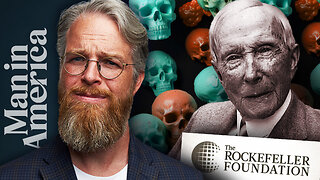 55:54
55:54
Man in America
7 hours agoFrom Oil Barons to Pill Pushers: The Rockefeller War on Health w/ Jeff Adam
20.1K3 -
 3:02:18
3:02:18
Barry Cunningham
4 hours agoBREAKING NEWS: PRESIDENT TRUMP THIS INSANITY MUST END NOW!
71.7K136 -
 LIVE
LIVE
StevieTLIVE
3 hours agoWednesday Warzone Solo HYPE #1 Mullet on Rumble
224 watching -
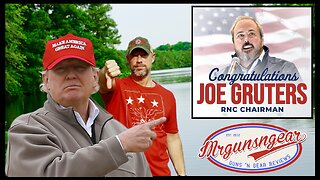 5:58
5:58
Mrgunsngear
5 hours ago $0.82 earnedBreaking: The New Republican Party Chairman Is Anti 2nd Amendment
13.8K5 -
 2:28:35
2:28:35
Geeks + Gamers
4 hours agoGeeks+Gamers Play- MARIO KART WORLD
18.6K -
![(8/27/2025) | SG Sits Down Again w/ Sam Anthony of [Your]News: Progress Reports on Securing "We The People" Citizen Journalism](https://1a-1791.com/video/fww1/d1/s8/6/G/L/3/c/GL3cz.0kob.1.jpg) 29:34
29:34
QNewsPatriot
5 hours ago(8/27/2025) | SG Sits Down Again w/ Sam Anthony of [Your]News: Progress Reports on Securing "We The People" Citizen Journalism
14.3K2 -
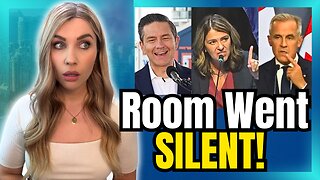 25:12
25:12
Jasmin Laine
9 hours agoDanielle Smith’s EPIC Mic Drop Fact Check Leaves Crowd FROZEN—Poilievre FINISHES the Job
19.3K21 -
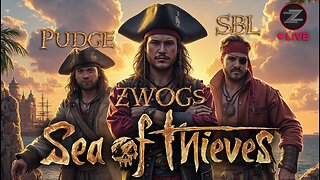 11:33:26
11:33:26
ZWOGs
13 hours ago🔴LIVE IN 1440p! - SoT w/ Pudge & SBL, Ranch Sim w/ Maam & MadHouse, Warzone & More - Come Hang Out!
10.6K -

This is the Ray Gaming
2 hours ago $0.01 earnedI'm Coming Home Coming Home Tell The World... | Rumble Premium Creator
6.08K